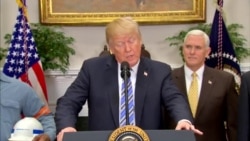ປະທານາທິບໍດີສະຫະລັດ ທ່ານດໍໂນລ ທຣໍາ ໃນວັນພະຫັດອາທິດແລ້ວນີ້ ໄດ້ເຊັນ
ເອກກະສານເພື່ອແຜ້ວທາງໃຫ້ແກ່ການເກັບພາສີສິນຄ້າຂາເຂົ້າຂອງຈີນ ຊຶ່ງເປັນ
ສ່ວນນຶ່ງ ຂອງແຜນການ ທີ່ປະທານາທິບໍດີທຣໍາ ຈະປາບປາມການລັກ ຂະໂມຍຊັບ
ສິນດ້ານສະຕິປັນຍາຂອງຈີນ. ແຕ່ພວກຊາວນາສະຫະລັດຫຼາຍໆຄົນ ພາກັນເປັນ
ຫ່ວງວ່າ ການເກັບພາສີດັ່ງກ່າວ ຈະພາໃຫ້ຈີນຕອບໂຕ້ຄືນ ຕໍ່ຜະລິດຕະພັນຂອງເຂົາ
ເຈົ້າ. ນັກຂ່າວ ວີໂອເອ ຄານ ຟາຣາບັອບ ແລະບິລ ກາລໂລ ມີລາຍງານກ່ຽວກັບ
ຄວາມຢ້ານກົວ ຂອງບາງຄົນທີ່ວ່າ ນີ້ອາດເປັນພຽງການເລີ້ມຕົ້ນ ຂອງການຂັດແຍ້ງ
ທີ່ສຳຄັນດ້ານການຄ້າ ລະຫວ່າງວໍຊິງຕັນ ແລະປັກກິ່ງ ຊຶ່ງກິ່ງສະຫວັນ ມີລາຍລະ
ອຽດມາສະເໜີທ່ານ ໃນອັນດັບຕໍ່ໄປ.
ທ່ານແຣນດີ ໂພສກິນ ຊາວສວນປູກໝາກຖົ່ວເຫຼືອງຢູ່ໃນເຂດຊົນນະບົດ ຂອງລັດອິລ
ລີນອຍ.
ຄືກັນກັບຫຼາຍໆຄົນ ຢູ່ໃນເຊດພາກຕາເວັນຕົກຕອນກາງຂອງສະຫະລັດ ລາວໄດ້
ປ່ອນບັດເອົາທ່ານດໍໂນລ ທຣໍາ ໃນການເລືອກຕັ້ງປີ 2016. ແຕ່ເວລາທ່ານທຣໍາ ເພີ້ມ
ຄວາມກົດດັນທາງການຄ້າກັບຈີນ ທ່ານໂພສກິນ ມີຄວາມເປັນຫ່ວງກ່ຽວກັບການຕົກ
ຢູ່ໃນທ່າມກາງຂອງສົງຄາມການຄ້າ.
ທ່ານໂພສກິນ ກ່າວວ່າ “ຂ້າພະເຈົ້າບໍ່ແນໃຈ ໃນຈຸດນີ້ ແຕ່ຂ້າພະເຈົ້າ ຢ້ານວ່າເຂົາ
ເຈົ້າຈະຕອບໂຕ້ຄືນຕໍ່ການເກັບພາສີສິນຄ້າຂາເຂົ້າຕ່າງໆ ແລະເຮັດແນວໃດແນວ
ນຶ່ງທີ່ຈະມີຜົນກະທົບຕໍ່ການສົ່ງອອກໝາກຖົ່ວເຫຼືອງ ເຂົ້າເບລ່ ສັດປີກ ໄກ່ ຊີ້ນງົວ
ຜະລິດຕະພັນທີ່ພວກເຮົາສົ່ງອອກ ໄປຍັງປະເທດເຂົາເຈົ້າ ທີ່ເຂົາເຈົ້າສາມາດ
ຕອບໂຕ້ໄດ້.”
ປະທານາທິບໍດີທຣໍາ ໃນວັນພະຫັດອາທິດແລ້ວນີ້ ໄດ້ເລີ້ມເຄື່ອນໄຫວ ໃນແຜນການ
ເກັບພາສີ ທີ່ມີມູນຄ່າເຖິງ 60 ພັນລ້ານໂດລາ ຕໍ່ສິນຄ້າຂາເຂົ້າຂອງຈີນ.
ການເຄື່ອນໄຫວນີ້ ຖ້າປະທານາທິບໍດີທຣໍາ ຫາກປະຕິບັດຕາມທີ່ໄດ້ໃຫ້ຄຳໝັ້ນສັນຍາ
ໄວ້ນັ້ນ ມັນໝາຍເຖິງການລົງໂທດຕໍ່ທຸລະກິດຂອງຈີນ ທີ່ໄດ້ຮັບຜົນກຳໄລຈາກການ
ເຂົ້າເຖິງເທັກໂນໂລຈີຂອງສະຫະລັດ ແບບບໍ່ເປັນທໍາ.
ປະທານາທິບໍດີທຣຳ ກ່າວວ່າ “ນີ້ແມ່ນເທື່ອທຳອິດຂອງຫຼາຍໆຄັ້ງ. ນີ້ແມ່ນເທື່ອທຳ
ອິດ. ມັນເປັນເທື່ອທຳອິດຂອງຫຼາຍໆຄັ້ງ.”
ບັນດາທຸລະກິດສະຫະລັດໄດ້ຈົ່ມທຸກມາເປັນເວລາດົນນານແລ້ວວ່າ ເພື່ອຈະເຂົ້າໄປ
ສູ່ຕະຫລາດຈີນໄດ້ ປັກກິ່ງກ່ອນອື່ນໝົດ ໄດ້ບັງຄັບໃຫ້ເຂົາເຈົ້າ ໂອນເທັກໂນໂລຈີໄປ
ໃຫ້ພວກເພື່ອນຮ່ວມງານທີ່ເປັນຊາວຈີນກ່ອນ.
ທ່ານເຈຟຟຣີ ເກີດສ໌ ຈາກສະຖາບັນບຣຸກກິ່ງ ກ່າວວ່າ “ບັນດາບໍລິສັດຕາເວັນຕົກ
ຕ້ອງໄດ້ມີເພື່ອນຮ່ວມງານກັບບໍລິສັດທ້ອງຖິ່ນຂອງຈີນ ໂດຍມອບເທັກໂນໂລຈີ
ຈຳນວນນຶ່ງທີ່ນຳໜ້າໂລກຂອງເຂົາເຈົ້າ ຊຶ່ງອຳນວຍໃຫ້ບໍລິສັດຈິນມີຄວາມ
ສາມາດເພີ້ມຂຶ້ນຢ່າງວອງໄວ ຖ້າບໍ່ດັ່ງນັ້ນເຂົາເຈົ້າຈະບໍ່ສາມາດເຮັດໄດ້.”
ແຕ່ຍັງບໍ່ທັນເປັນທີ່ແຈ້ງຂາວເທຶ່ອວ່າ ທ່ານທຣຳຈະດຳເນີນການຕື່ມອີກຫຼາຍປານໃດ
ເພື່ອເອົາມາດຕະການທີ່ເຂັ້ມງວດກັບຈີນ.ທ່ານເກີດສ໌ ກ່າວວ່າ “ເວລາທ່ານເບິ່ງນະ
ໂຍບາຍການຄ້າຂອງທ່ານທຣໍາ ມັນເປັນນະໂຍຍາຍອັນຈະແຈ້ງທີ່ໄດ້ເຫັນ ຊຶ່ງ
ໃນນັ້ນທ່ານໄດ້ຍິນການປະກາດດ້ວຍສຳນວນໂວຫານທີ່ໃຫຍ່ໆຫຼາຍຢ່າງ ແຕ່ພໍ
ເຖິງເວລາທີ່ມີການຈັດຕັ້ງປະຕິບັດນະ ໂຍບາຍໂຕຈິງຊ້ຳພັດມີການຫລຸດລົງ ສ່ວນ
ໃຫຍ່ແມ່ນເພື່ອໃຫ້ສອດຄ່ອງກັບປະຫວັດການບັງຄັບໃຊ້ນະໂຍບາຍການຄ້າຂອງ
ສະຫະລັດ.”
ການເຄື່ອນໄຫວດັ່ງກ່າວອາດໃຊ້ໄດ້ໃນຮອບນີ້. ແຕ່ກໍຍັງມີຄວາມສ່ຽງຢູ່.
ຢູ່ທີ່ປັກກິ່ງ ບັນດາຜູ້ນຳພັກຄອມມິວນິສ ໄດ້ຂົ່ມຂູ່ແລ້ວວ່າຈະຕອບໂຕ້ຄືນ.
ໂຄສົກກະຊວງຕ່າງປະເທດຈີນ ທ່ານນາງຮວາ ຈຸນຢີງ ກ່າວວ່າ “ຈີນຈະບໍ່ນັ່ງຢູ່ລ້າ ໃນຂະນະທີ່ສິດທິຢ່າງຖືກຕ້ອງຕາມກົດໝາຍແລະຜົນປະໂຫຍດຂອງຕົນໄດ້ຮັບ
ຄວາມເສຍຫາຍ. ພວກເຮົາຕ້ອງເອົາທຸກມາດຕະການທີ່ຈຳເປັນເພື່ອປົກປ້ອງ
ຢ່າງແຂງຂັນຕໍ່ສິດທິ ແລະຜົນປະໂຫຍດຂອງພວກເຮົາ.”
ເປົ້າໝາຍທີ່ສຳຄັນແມ່ນຫຍັງ ບັນດາຜູ້ສະໜັບສະໜູນທ່ານທຣໍາ ຢູ່ໃນອຸດສາຫະ ກຳປູກຝັງຂອງສະຫະລັດ.
ໂດຍສະເພາະຢ່າງຍິ່ງ ພວກຊາວສວນທີ່ປູກໝາກຖົ່ວເຫຼືອງ ນຶ່ງໃນທຸກໆສາມແຖວ
ຂອງໝາກຖົ່ວເຫຼືອງ ທີ່ປູກໃນສະຫະລັດ ແມ່ນສົ່ງອອກໄປຂາຍໃຫ້ຈີນ ນັ້ນແມ່ນເຮັດ
ໃຫ້ຊາວສວນປູກໝາກຖົ່ວເຫຼືອງ ຕົກຢູ່ໃນຄວາມສ່ຽງເປັນພິເສດທີ່ຈະຖືກຕອບໂຕ້
ຈາກຈີນ.
ທ່ານນາງທາມາຣາ ແນວເສີນ ຈາກຫ້ອງການປູກຝັງລັດອິລລີນອຍ ກ່າວວ່າ “ຈີນ
ນຳເຂົ້າປະມານ 51 ເປີເຊັນ ໃນການສົ່ງອອກໝາກຖົ່ວເຫຼືອງຂອງພວກເຮົາ
ເພາະສະນັ້ນ ຈີນແມ່ນຮັບຊື້ ການສົ່ງອອກໝາກຖົ່ວເຫຼືອງທັງໝົດຂອງສະຫະ
ລັດ ຫຼາຍກວ່າເຄິ່ງນຶ່ງ.”
ການຂົ່ມຂູ່ດັ່ງກ່າວເຮັດໃຫ້ຊາວສວນປູກໝາກຖົ່ວເຫຼືອງ ຄືືກັນກັບທ່ານໂພສກິນ ມີຄວາມຮູ້ສຶກປະສົມປະສານກ່ຽວກັບທ່ານທຣໍາ.
ທ່ານໂພສກິນ ກ່າວວ່າ “ຂ້າພະເຈົ້າບໍ່ແນ່ໃຈ. ຂ້າພະເຈົ້າໝາຍຄວາມວ່າ ຂ້າພະ ເຈົ້າມັກດ້ານກົດລະບຽບຂອງສິ່ງຕ່າງໆ ວິທີທີ່ທ່ານຖອນໂຕອອກ. ແຕ່ກໍຄືກັນ ບັນດາເຂດການຄ້າເສລີເປັນສິ່ງສໍາຄັນຕໍ່ການກະສິກຳ. ພວກເຮົາບໍ່ສາມາດທີ່ຈະລົບກວນເລື່ອງນີ້.”
ແລະມັນອາດຈະເປັນພຽງ ການເລີ້ມຕົ້ນຂອງຄວາມເຄັ່ງຕຶງທາງດ້ານການຄ້າ.
ປະທານາທິບໍດີທຣໍາກ່າວວ່າ ທ່ານບໍ່ມີຄວາມຢ້ານກົວ ທີ່ຈະເກີດຜົນກະທົບໃນ
ທາງລົບ ກ່ຽວກັບການຕັດສິນໃຈເກັບພາສີຂາເຂົ້າຂອງທ່ານໂດຍກ່າວວ່າ ສົງ
ຄາມການຄ້າແມ່ນ “ດີ ແລະງ່າຍທີ່ຈະເອົາຊະນະໄດ້.”
[[U.S. President Donald Trump on Thursday signed a memo paving the way for major tariffs on Chinese imports. It's part of Trump's plan to crack down on China's theft of intellectual property. But many U.S. farmers are worried the tariffs will prompt China to retaliate against their products. VOA's Kane Farabaugh and Bill Gallo report on what some fear could be just the start of significant trade friction between Washington and Beijing.]]
Randy Poskin grows soybeans in rural Illinois.
Like many in the Midwest, he voted for Donald Trump in the 2016 election. But as Trump ramps up trade pressure on China, Poskin is concerned about getting caught in the middle of a trade war.
"I'm not sure at this point, but I'm fearful they will retaliate on those tariffs and do something to corner soybean exports, wheat, poultry, chicken, beef - any number of products that we export to their country that they could retaliate with."
Trump on Thursday set in motion a plan to impose tariffs on as much as $60 billion worth of Chinese imports.
The move - if Trump follows through with it - is meant to punish Chinese businesses that benefit from unfair access to U.S. technology.
"This is the first of many. The first one. The first of many."
U.S. businesses have long complained that, in order to enter China, Beijing forces them to first transfer technology to Chinese partners.
"Western companies have had to sort of partner with local Chinese firms, give over some of their world-leading technology, which has allowed Chinese firms to catch up more rapidly than they otherwise would be able to."
But it's not yet clear how far Trump is willing to go to to get tough on China.
"When you look at Trump trade policy, there's a clear policy that you've seen. Which is that you have announcements with a lot of big rhetoric, very aggressive, very dramatic rhetoric, but when it comes time to actually implement the policy it's much more toned down, much more in line with historical US trade enforcement policy."
That pattern may hold this round, as well. But there are still risks.
In Beijing, Communist Party leaders are already threatening to retaliate.
"China will not sit idly by while legitimate rights and interests are hurt. We must take all necessary measures to firmly defend our rights and interests."
A prime target? Trump's supporters in the U.S. farming industry.
Specifically, soybean farmers. One in every three rows of U.S. soybeans is exported to China. That makes soybean farmers uniquely vulnerable to Chinese retaliation.
"China imports about 51 percent of our soybean exports, so out of all the United States soybean exports, China takes more than half of them."
That threat is leaving many farmers, like Poskin, with mixed feelings about Trump.
"I'm not sure. I mean I do like the regulation side of things, the way he's backing things off. But just the same, these areas of trade are very important to agriculture. We can't interrupt this."
And it may only be the beginning of trade tensions.
Trump has said he doesn't fear the negative implications of his tariff decisions, saying trade wars are, quote, "good and easy to win."





